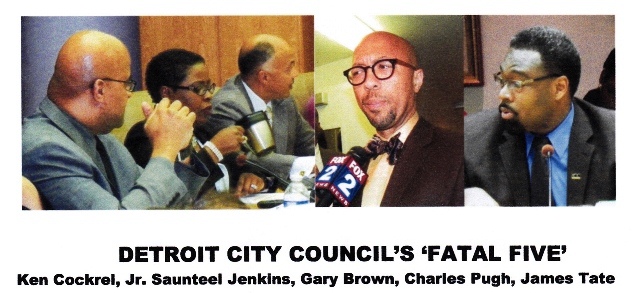By Diane Bukowski
July 4, 2012
Breaking news: Three Detroit women, Yolanda King, Yvonne Ross, and Rose Roots, have filed a citizens’ lawsuit challenging the Detroit consent agreement. It replicates the grounds in the lawsuit filed by Corporation Counsel Krystal Crittendon June 1 against the state, but City of Detroit officials are the defendants in this suit. It was filed in Wayne County Circuit Court July 3. It is to be heard in front of Judge Amy Hathaway on July 13. More on this from Voice of Detroit later.
July 3, 2012
DETROIT – One strong, brilliant Black woman attorney has so far held off the administrations of Michigan Gov. Rick Snyder and Detroit Mayor Dave Bing, the state courts, the major media, and the banks and corporations who are dancing them on puppet strings in their pursuit of Detroit’s public income and resources.
Backed up by a half-dozen members of her family, Detroit Corporation Counsel Krystal Crittendon spoke at the NAACP general membership meeting June 28, which was held at Triumph Baptist Church.

- State Treasurer Andy Dillon before the June 28. 2012 Financial Advisory Board meeting, held at WSU Law School. Dillon did not appear publicly at the meeting itself, but most of the meeting was held in closed session behind closed doors, with Attorney Michael McGee, co-auther of Public Act 4, also in attendance.
Wall Street had threatened to further downgrade the city’s bond ratings if she appealed Ingham County Circuit Judge William Collette’s dismissal of her lawsuit against the Detroit Public Act 4 consent agreement. State Treasurer Andy Dillon had threatened to withhold another revenue-sharing payment if she persisted.
At the time, the appeal or a motion for reconsideration was due by July 5. Crittendon did not reveal her office’s plans on the matter, but explained what has given her the strength to stand firm so far.
“I have had so much support expressed from people all over, people I don’t even know, emails and flowers,” she said. “My mother has heard from people she had not heard from for 40 years.”
One member of the audience called out, “Stand strong, sister,” as others encouraged her to appeal.
Crittendon explained the grounds for the lawsuit and the emptiness of the state’s threats.
“That bond deal goes through the Michigan Finance Authority (MFA), which is not the state of Michigan,” Crittendon said. “It’s an autonomous agency. The treasurer has only a statutory appointment as chair. It’s the treasurer, not me, who is threatening to withhold his signature from the documents.”
 Crittendon explained the basis for her lawsuit, which contends that both state and city law forbid municipalities from contracting with entities in debt to them. So far, her office has identified at least $307 million the state owes to Detroit.
Crittendon explained the basis for her lawsuit, which contends that both state and city law forbid municipalities from contracting with entities in debt to them. So far, her office has identified at least $307 million the state owes to Detroit.
“Under the Home Rule City Act in the Michigan Constitution, it has been the case since 1909 that you cannot contract with anyone who is in debt to the city,” Crittendon said. “The City Charter didn’t contain a similar provision until 2012, under its current revision. Any contractor has to get a number of clearances from the city, from its Human Rights Department, its income and property tax divisions, and others before it is approved. That has always been the case.”
Crittendon said she had attended Charter Revision Commission meetings and argued against giving independent power to the Corporation Counsel and the Law Department, saying she did not feel it was necessary.
“But now, under Sections 2.113, relating to default, and 7.5-209, I am absolutely clear on what my responsibilities are under the Charter. The Charter also contains more stringent and enhanced definitions of what constitute violations of the Charter. It would be a Charter violation for the Corporation Counsel not to enforce the Charter.”
She cleared up a commonly-held misconception about the possible repeal of Public Act 4, the emergency manager act. Many believe that its predecessor Public Act 72 would be resurrected if PA4 is repealed.
But Crittendon said, “If PA4 is no longer the law, PA 72 would not come back.”
She said the Bing administration did not use the Corporation Counsel’s office in the process of drafting the PA4 consent agreement. That agreement gives broad powers to a nine-member Financial Advisory Board, a Chief Financial Officer, a Program Management Director, and the Michigan treasurer and governor which allow them to overrule decisions of elected city officials. The overseers must approve all bond and debt matters, determine whether the city has breached the consent agreement, and see to it that Appendix B of the agreement, which provides that collective bargaining will no longer be required after July 16, is enforced.

- Attorney Michael McGee (center) consults with Detroit COO Chris Brown prior to Financial Advisory Board meeting 6/28/12. McGee and numerous others from the audience followed the FAB into their closed session, allegedly to discuss union collective bargaining agreements. The city has notified its unions that it does not plan to continue conditions of their current contracts after June 30 while bargaining, which is normally done. The PA 4 consent agreement calls for an end to any obligation on the part of the city to bargain after July 16. During conversation with VOD, Brown claimed VOD reports that McGee is the co-auther of Public Act 4 are “slanderous,” despite the fact that McGee admitted his role in drafting the agreement himself in a Michigan magazine article which VOD re-published earlier.
“I was asked by a City Council member to look at it over the course of a weekend,” Crittendon said. “I issued a very cursory opinion before the Council vote, but the document was turned back over to outside counsel [attorney Michael McGee, of Miller, Canfield, Paddock and Stone]. He should have looked at the City Charter, state law, federal law, but on April 4 the Council passed a resolution approving the agreement, and on April 11, the Governor put his seal on it.”
Crittendon said that afterwards, she had time to more fully review the legality of the agreement. She discovered not only the much disputed $224 million in revenue-sharing owed to Detroit since a 1998 agreement between former Mayor Dennis Archer and former Governor John Engler. She noted in a letter to Dillon April 11 that he had admitted the existence of that debt on the air.
“We discovered a lot of other unpaid bills owed by the state,” Crittendon said. “They included sewer water drainage bills from the state freeways, $347,000, and electric bills for traffic lights on state trunk lines owed to the Public Lighting Department. I issued another privileged and confidential document to the City Council in light of the newly discovered information, telling them it was my obligation to inform them of the debts. Our office did not immediately file a lawsuit, but the State of Michigan said it had no contracts in default.”
She said her office had followed all preliminary steps required of it to enforce the Charter, and was left with no other option than “judicial action” newly cited under the Charter.

- Ingham County Circuit Court Judge William Collette at hearing on lawsuit June 13, 2012. He said his mind was made up to dismiss the suit from the beginning.
Crittendon said that Collette made no determination of the merits of the lawsuit before arbitrarily dismissing it, and did not consider the new charter provisions giving independent powers to the Corporation Counsel.
Crittendon said her office has now asked for and received a copy of the Miller, Cohen contract under which McGee was being paid, since the new Charter requires that the Corporation Counsel approve all contracts with outside Counsel. She said the contract, however, was approved by “a previous Corporation Counsel.”
Crittendon became Corporation Counsel under interim Mayor Kenneth Cockrel, Jr. in 2009. Previous Corporation Counsels under Mayor Kwame Kilpatrick were Valerie Colbert-Osamuede and John Johnson, Jr., who is now counsel for the Michigan NAACP. Johnson chaired the meeting.
Johnson earlier issued an opinion, which Crittendon noted in her advice to the City Council, that the $224 million state revenue-sharing debt to Detroit was not enforceable. Crittendon, however, disagreed in her opinion, noting Dillon had admitted its existence.
Crittendon said the best way for citizens to contest the agreement now is to file ethics charges against the city officials responsible for approving it. That includes Mayor Dave Bing, Deputy Mayor Kirk Lewis, COO Chris Brown, and the “Fatal Five” members of the City Council who voted for it.
To read Crittendon lawsuit, click on Crittendon Lawsuit 6 1 12.
Ethics Complaint form posted by Free Detroit No Consent:
To download a copy, click on Board-of-Ethics-Complaint_Form-201206c latest.
This is the most recent Free Detroit Ethics Complaint form, please distribute. Please note there is NO contact information on the form other than the Board of Ethics. Please instruct those receiving to contact 313-444-0061 or info@freedetroit.org to arrange turning their form in as a group.
Visit http://freedetroit.org and subscribe to email announcements of new posts using the box at top right. Rich media content will not come through those emails (video, audio, photos, etc).
Some related VOD articles:






Attn: VOD
The lawsuit basis of the Detroit legal dept. is based on the statute description that no contract can be issued between Detroit and any other legal entity, in this case the State of Michigan, if one party is in arrears. This action is a double edged sword!! Let’s just suppose that Detroit wins this argument – The State of Michigan then cannot realease any of the many funds, grants, or loans that would be sent to Detroit because the contract cannot be validated. In trying to win this battle, Detroit is risking the loss of all State funding for Detroit.
Dave Johnson
You are assuming that Detroit owes the STATE money, but you have cited no examples. Additionally, the statute does NOT state “if one party is in arrears.” It states that if the contractor is in arrears to the municipality, a contract is barred.